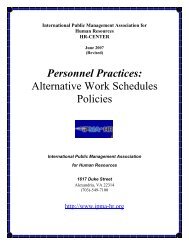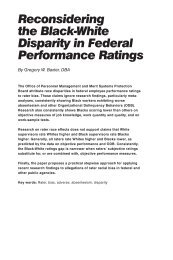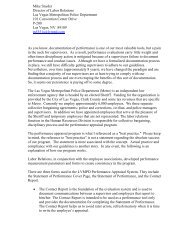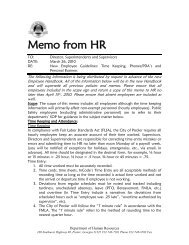October 2010 issue of HR News magazine - IPMA
October 2010 issue of HR News magazine - IPMA
October 2010 issue of HR News magazine - IPMA
You also want an ePaper? Increase the reach of your titles
YUMPU automatically turns print PDFs into web optimized ePapers that Google loves.
comP doctor tm<br />
By Jim Fox and Bruce Lawson, Fox Lawson & Associates, A Division <strong>of</strong> Gallagher Benefit Services, Inc.<br />
Question: we have just been<br />
hammered with requests from the city<br />
council, the media, the public and every<br />
other life form on the planet about the<br />
salaries and benefits <strong>of</strong>fered by our city.<br />
this is probably the result <strong>of</strong> the considerable<br />
publicity about exorbitant compensation<br />
paid to <strong>of</strong>ficials in a few cities in<br />
california including a city manager<br />
making almost $800,000 per year in a<br />
city with fewer than 50,000 residents. at<br />
the same time, there are reports that a<br />
former city manager in another small<br />
california city was receiving a pension <strong>of</strong><br />
more than $500,000 per year. to quote<br />
the former head <strong>of</strong> bP, we just want our<br />
lives back. what, if anything, can we do<br />
to “make this right”?<br />
CompDoctor TM<br />
: You want your<br />
life back? Just remember that the author<br />
<strong>of</strong> that quote got his life back and,<br />
although he is still employed by BP, his<br />
new outpost is Russia and not London.<br />
Unfortunately, this situation, we believe, is<br />
not going to go away easily or smoothly<br />
but there is a lot you can do to at least<br />
address the problem and hope that the<br />
stakeholders in your community are openminded<br />
enough to listen and smart<br />
enough to understand the facts. If they<br />
are not, then little that we say can or do<br />
will make much <strong>of</strong> difference, at least in<br />
the short run.<br />
The situation that has arisen in California<br />
as a result <strong>of</strong> the revelations <strong>of</strong> compensation<br />
abuse in the city <strong>of</strong> Bell is, we believe,<br />
unique, and, we hope, isolated.<br />
Unfortunately, the media has played this<br />
up in such a way that every public agency<br />
in California, if not throughout the nation,<br />
is now going to be subject to a level <strong>of</strong><br />
scrutiny about compensation that heret<strong>of</strong>ore<br />
only existed when we went in for our<br />
annual physical exam. Now, we know that<br />
over the years there have been many local<br />
newspapers that have periodically<br />
published the salaries <strong>of</strong> all public <strong>of</strong>ficials<br />
earning over a certain amount <strong>of</strong> money.<br />
Many eons ago (back in the ’60s), we<br />
recall that the amount was $10,000 per<br />
year. (When you all stop laughing, we will<br />
| 22 | OCTOBER <strong>2010</strong><br />
go on.) Slowly, the base amount rose to<br />
$25,000, then to $50,000 and then to<br />
$100,000. Now we have cities, counties<br />
and other units <strong>of</strong> government paying<br />
some top <strong>of</strong>ficials $300,000 or more in<br />
base pay. Whether these amounts are<br />
appropriate is a topic that we will be<br />
happy to address in the future; however,<br />
for now, we will focus on how to deal with<br />
the public scrutiny about public sector pay.<br />
Over the past three to four years, we have<br />
all seen major exposés on private sector<br />
compensation abuses coming out <strong>of</strong> the<br />
financial services meltdown and the<br />
golden parachutes that many private executives<br />
have received, even when their<br />
performance was not stellar. We now have<br />
the federal government providing oversight<br />
<strong>of</strong> pay levels in certain private organizations<br />
as well as not for pr<strong>of</strong>its, and others<br />
are now required to disclose their<br />
compensation levels to shareholders and<br />
subject them to advisory votes. We can all<br />
ask why this is necessary but it appears to<br />
stem from individuals getting greedy,<br />
comparisons with inappropriate peers<br />
(which means they really are not peers)<br />
and not thinking about compensation<br />
from a strategic view. When organizations<br />
define their compensation philosophy and<br />
strategies up front and there is open<br />
discussion <strong>of</strong> the philosophy and strategies,<br />
we find that there is generally less<br />
resistance to how pay is delivered and the<br />
amounts <strong>of</strong> pay.<br />
In a survey conducted by <strong>IPMA</strong>-<strong>HR</strong>, 78<br />
percent <strong>of</strong> public sector organizations<br />
have a defined pay philosophy. Whether<br />
that philosophy has been widely shared,<br />
or instructive, is another matter.<br />
However, we have digressed, so back to<br />
the <strong>issue</strong> at hand. What can you do about<br />
this mess?<br />
There are some things you can do right <strong>of</strong>f<br />
the bat; the first would be to have an independent<br />
audit <strong>of</strong> your pay setting process.<br />
For example, the state <strong>of</strong> Colorado<br />
conducts annual audits (through the <strong>of</strong>fice<br />
<strong>of</strong> the state auditor) <strong>of</strong> the salary survey<br />
process used by the Colorado State<br />
Personnel Department to determine salary<br />
adjustments for state employees. The city<br />
<strong>of</strong> Denver conducts a similar audit every<br />
three to four years.<br />
The audit process serves a very legitimate<br />
and public purpose and that is to show<br />
the stakeholders that the salary levels are<br />
reflective <strong>of</strong> the labor market and that the<br />
process used to determine salary levels<br />
can withstand public scrutiny. In other<br />
words, the process and the results are<br />
valid and reliable. If you have not had an<br />
audit <strong>of</strong> your pay system process and pay<br />
levels in the last couple <strong>of</strong> years, you<br />
might want to consider having one done<br />
at the earliest opportunity.<br />
The second thing you can do (and agencies<br />
in California will be doing this<br />
because they will have no choice given<br />
legislative mandates that will no doubt<br />
result) is to put your entire job classification<br />
and pay plan on your Web site.<br />
The reason we say both the classification<br />
and the pay plan is so that anyone can<br />
look up any job, see what it is, and what it<br />
gets paid. One <strong>of</strong> the problems that we<br />
have noted with the publicity resulting<br />
from the Bell situation is that reporters<br />
have been trying to show comparative<br />
data but, because the data is not easily<br />
available, they are making some rather<br />
erroneous assumptions and conclusions.<br />
This is simply a result <strong>of</strong> comparing job<br />
titles without any understanding <strong>of</strong> the<br />
differences in actual duties between<br />
organizations even though the titles may<br />
be the same or similar.<br />
Publishing actual employee salaries is<br />
another matter. Ultimately, that information<br />
is public record in most states but<br />
whether you are willing to list every<br />
employee and show their current job title<br />
and their current pay, is a decision that<br />
each agency will have to make for itself.<br />
A third thing you might do is become<br />
proactive. Rather than waiting for the<br />
media to come to you to ask for information,<br />
go on the <strong>of</strong>fensive. Post and provide<br />
information that not only talks about what<br />
you are paying, but WHY you are paying<br />
what you are, which takes you back to the<br />
pay strategy! The public needs to understand<br />
why pay levels are what they are<br />
and, more importantly, what they are<br />
getting (i.e., performance) for their money.<br />
For example, if you pay your city manager<br />
and department heads more than comparable<br />
cities, but your crime rate is low,<br />
<strong>HR</strong> NEWS MAGAZINE

















